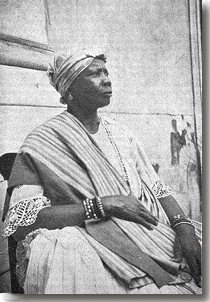Eugênia Anna Santos
Eugênia Anna Santos | |
|---|---|
 Eugênia Anna Santos (Mãe Aninha, Oba Biyi) | |
| Born | (1869-07-13)13 July 1869 Salvador, Bahia |
| Died | 3 January 1938(1938-01-03) (aged 68) |
| Nationality | Brazilian |
| Occupation | priest |
| Known for | Iyalorixá |
Eugênia Anna Santos (Mãe Aninha, Oba Biyi; Salvador, Bahia, 13 July 1869 - Salvador, 3 January 1938) was a Brazilian Iyalorixá. She founded the candomblé Ilê Axé Opó Afonjá in Salvador, now considered a National Historic Landmark, and in Rio de Janeiro.[1]
Life
Santos was born in 1869 to African parents of the Gurunsi nation.[2] She served as the chief female officer, known as prioreza, of the Boa Morte sisterhood and Rosario brotherhood.[3] In 1936, Santos was one of the founders of the Segundo Congresso Afro-Brasileiro.[4]
Legacy
Santos is remembered for her great leadership qualities and strength.[4] Author Kim Butler states that she "went further than any other priest in transforming the terreiro into an alternative, African world in the heart of Brazil", which "reflected ways in which the candomblé community was part of the larger Afro-Bahaian community".[3] Darlene Clark Hine and Jacqueline McLeod credit her with moving the "candomblé out of the shadows by opening the doors of her terreiro to the international community".[5]
The Municipal School Eugenia Anna dos Santos was established in her name in 1978 for nursery children aged 6 months to 5 years, and from 1986, for elementary children from 1st to 4th grade.[6]
References
- ^ "Personalidades Negras – Mãe Aninha" (in Portuguese). Government of Brazil - Fundação Cultural Palmares. Retrieved 13 December 2015.
- ^ Bay & Mann 2013, p. 193.
- ^ a b Butler 1998, p. 199.
- ^ a b Lopes 2015, p. 207.
- ^ Hine & McLeod 1999, p. 128.
- ^ Wolhuter & Wet 2014, p. 163.
Sources
- Bay, Edna G.; Mann, Kristin (13 September 2013). Rethinking the African Diaspora: The Making of a Black Atlantic World in the Bight of Benin and Brazil. Taylor & Francis. ISBN 978-1-135-31073-8.
- Butler, Kim D. (1998). Freedoms Given, Freedoms Won: Afro-Brazilians in Post-abolition, São Paulo and Salvador. Rutgers University Press. ISBN 978-0-8135-2504-4.
- Hine, Darlene Clark; McLeod, Jacqueline (1999). Crossing Boundaries: Comparative History of Black People in Diaspora. Indiana University Press. ISBN 0-253-21450-5.
- Lopes, Nei (9 March 2015). DICIONÁRIO ESCOLAR AFRO-BRASILEIRO. Selo Negro. ISBN 978-85-87478-96-2.
- Wolhuter, Charl; Wet, Corene de (1 March 2014). International Comparative Perspectives on Religion and Education. AFRICAN SUN MeDIA. ISBN 978-1-920382-37-7.
Bibliography
- JOAQUIM, Maria Salete. O papel da liderança religiosa feminina na construção da identidade negra. Pallas Editora. 2001. 187 p. ISBN 8534702470. (in Portuguese)
- LIMA, Vivaldo da Costa. O candomblé da Bahia na década de 30. Vol. 18, pp. 201–221. 2004. (in Portuguese)
- LIMA, Vivaldo da Costa. A família de santo nos candomblés jejes-nagôs da Bahia: um estudo de relações intragrupais. Português. ed.2a. Salvador. Corrupio. 2003. 216 p. ISBN 8586551171. (in Portuguese)
- LIMA, Vivaldo da Costa. Lessé Orixá, nos pés do santo. Editora Corrupio. Salvador. 2010. ISBN 978-85-86551-42-0. (in Portuguese)
- MARIANO, Agnes; QUEIROZ, Aline. Obàrayi - Babalorixá Balbino Daniel de Paula. 2009. Barabô. ISBN 978-85-62542-00-8. (in Portuguese)
- OLIVEIRA, Waldir Freitas. As pesquisas na Bahia sobre os afro-brasileiros. (in Portuguese)
- PIERSON, Donald. Negroes In Brazil: A Study of Race Contact at Bahia. The University of Chicago Press. p. 392. 1942.
- PRANDI, Reginaldo. Segredos Guardados: Orixás na Alma Brasileira. Companhia das Letras. 2005. ISBN 8535906274. (in Portuguese)
- ROCHA, Agenor Miranda. As Nações Kêtu: origens, ritos e crenças: os candomblés antigos do Rio de Janeiro. 2a-edição. MAUAD Editora Ltda. 2000. 112p. ISBN 8574780189. (in Portuguese)
- ROCHA, Agenor Miranda. Caminhos de Odu. 2a ed. Rio de Janeiro. Pallas. 1999. ISBN 8534702128. (in Portuguese)
- SANTANA, Marcos. Mãe Aninha de Afonjá: um mito afro-baiano. Português. ed.1a. Salvador. EGBA. 2006. 100 p. ISBN 8575051520. (in Portuguese)
- SANTOS, Maria Stella de Azevedo. Meu Tempo é Agora. São Paulo. Editora Oduduwa. 1993. (in Portuguese)
- SANTOS, Deoscóredes Maximiliano dos. História de Um Terreiro Nagô. 2a.edição. Editora Max Limonad. 1988. (in Portuguese)









